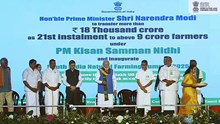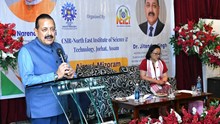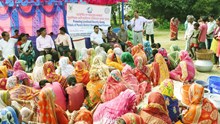
Dr Paroda was the Director General of the Indian Council of Agricultural Research and the Secretary Department of Agricultural Research and Education. Dr Paroda is a Fellow of almost all Science Academies of India, beside Fellow of Third World Academy of Sciences (TWAS), Russian Academy of Agricultural Sciences, Tajik Academy of Agricultural Sciences, and Armenian Academy of Agricultural Sciences. He is also elected Honorary Member of the American Society of Agronomy and the Crop Science Society of America. He has been conferred honorary D.Sc. Degree by 15 academic institutions including Ohio State University, Indian Agricultural Research Institute, Scientific Council of Agricultural Academy, Republic of Azerbaijan and State Agricultural Universities at Pantnagar, Kanpur, Jorhat, Coimbatore, Hyderabad, Udaipur, Varanasi, Srinagar, Meerut, Bhubneshwar, Ludhiana and Dharwad. He also received Honorary degrees from Agricultural Universities of Azerbaijan, Kyrgyzstan and Tajikistan. International Crop research Institute for Semi-Arid Tropics (ICRISAT), Hyderabad has named its Gene Bank after him as 'Rajendra S. Paroda Gene Bank'. He is also winner of Norman Borlaug Award
Harnessing Agricultural Sciences with an accelerated movement for the welfare of people as a goal and to promote growth and advancement of agriculture through scientific interactions and partnership as a mission, the TAAS was created in 2001 as Trust for Advancement of Agricultural Sciences. In view of the increasing population and making the India `Hunger Free`. during the last one decade, TAAS as a `Think Tank`, has been able to catalyze the process of either creating an enabling policy environment or generating much required public awareness on issues of national importance. Through Efficient and Sustainable use of our human, natural and other resources by 2020 India will be free of poverty and malnutrition, and become an environmentally safe country. Dr R S Paroda, Chairman of the Trust for Advancement of Agricultural Sciences (TAAS) had interacted the Agriculture World Team on the Overall Achievements and Impact of TAAS. The Agriculture World Team especially tries to find out how TAAS is working for the benefit of the Farmaing Community. Dr Paroda elaborately explained the role of the TAAS and also informed that TAAS has been publishing several strategy papers of eminent scientists and the proceedings of national seminars organized on the subjects of national importance. To create much needed public awareness on issues of immediate relevance for the benefit of the Scientists, Farmers and the other key stakeholders. Dr Paroda also emphasized that we always talk about the India as an agriculture based country and now the need is to give importance to the Farmer to make our country self reliant because we are having the innovation and new technologies in the agriculture, which are not fully utilized and implemented. Today the farmers are looking towards the technologies which are cheaper and the profitable. For that appropriate ways and means are to be used. IPM, INM, Climate Smart Agriculture to be given preferences so that the farmer to be benefitted with the profit. In view of the current challenges of retaining youth in agriculture, TAAS is working as catalyst to the National Agriculture Research System (NARS), to engage youth in agriculture and evolve progressive strategies to attract them towards secondary/specialty agriculture by ensuring much needed vocational training and bank credits. Our proposal to make them technology agents/service providers and input implement providers, entrepreneurs for value addition and primary processing and also for linking farmers to market is currently receiving due attention of the policy/decision makers. He further stressed the urgent need for out scaling the innovations that save inputs and enhancing the income of the farmers such as conversion agriculture, plastic mulching, direct seeding of rice, alternate furrow irrigation, microirrigation, fertigation, etc. Adoption of small farm mechanization is also for achieving much needed resilience in agriculture. TAAS is also working for the researchers, policy makers, and development officials by sensitizing them to up-scale and out-scale farmer led innovations, which are cost effective, sustainable and useful to them for increasing both production and profitability. He also informed that TAAS is not involved in any R&D of Agriculture but the Agriculture Scientists finds some solutions for the farmers who has to face these problems daily during their course of action. These problems are climatic changes, the loss of protein nutritious elements, lack of sufficient funds, soil management etc. to be addressed by the world renowned scientists in the seminars organized by the TAAS. TAAS is an independent organization without any financial help from the Government sources. Dr Paroda also informed that recently they had initiated the life membe rs h ip f o r t h e eme ri t u s agriculture scientists and also initiated t h e c o r p o r a t e i n s t i t u t i o n a l membership. They can get the information as well as they can participate in all the activities of the TAAS. Apart from this TAAS also gives away the Awards for the significant contributions in the field of agricultural research and technology development as Leadership in Agriculture titled Dr M S Swaminathan Award. Up till now Eight Awards have been conferred so far. Speaking on the issues of the Ge n e t i c a l l y M o d i f i e d Cr o p s, Dr Paroda advocacy was for the GM crops which are the new and successful technology. The cotton farmers are getting good yield with this technology. Efforts have also been made to change the public perception based on scientific reasoning and informed knowledge concerning the benefits of technology to both farmers and the consumers. He also emphasized the need for efficient regulatory system in the conduct of confined field trials and ultimate release of GM crops for general cultivation in the national interest. With this technology many countries are progressing. Many farmers are not adopting the modern techniques resulting less than average yield. Farmers are required to get the good yield through the modern techniques usages as well as the qualitative and quantitative production. He also emphasized the women empowerment and advised that the women should also come forward in the area of agriculture and the youth to be partner in the agriculture production. For that the vocational training and the innovative approaches to be catered to them. Efforts are on to provide need based knowledge to the farming community through use of ICT, smart phones and media to address effectively the adverse effects of climate change and also the weather related calamities. TAAS is working to promote climate smart agriculture, crop as well as livestock insurance, seed banks, credit at low interest, immediate compensation using GIS based weather data and on the spot quick assessment are being considered critical to redress the grievances of small holder farms. Dr Paroda further stressed that the Food, nutrition and environmental security cannot be attained without an immediate check on the runaway population growth. TAAS vision of 2001 was to make India free of poverty, hunger and malnutrition, and become an environmentally safe country. He was of the opinion that will be p o ssi b l e t o a c h i e v e t h r o u g h accelerated social and economical and economic development. Dr Paroda added that India can banish poverty and emerge as a developed nation by promoting growth through efficient and sustainable use of our human, natural and other resources. India`s strong institutional and human resource base in science and technology is fully capable of bringing about a technological transformation of agriculture, paving the way for an ever-green revolution. Dr Paroda emphasized to increase productivity through creation of a `Seed Mission` at the national level wi th be t t e r coordinat ion and convergence of public and private seed organizations for faster growth, including rolling plan for 5 years in each State to ensure availability of good quality seed for higher replacement ratio in important crops.
Interviewed by
Ruby Jain and Imran Khan














Share your comments